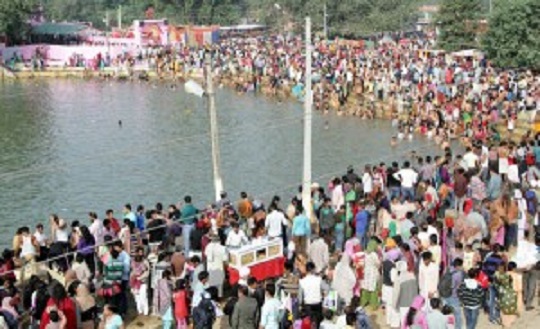Jhiri Mela
This is a collection of articles archived for the excellence of their content. |
A tribute to Bawa Jitto
Rajesh Dutta, Jhiri Mela, A tribute to Bawa Jitto, 6/11/2016, Daily Excelsior
Like every year, Jhiri mela popularly known as “farmer’s mela”, is all set to be held on Kartik Poornima, in the month of November. This mela is one of the most attended historic annual fairs in which lakhs of participants’ from northern India particularly from Punjab, Haryana, Himachal Pradesh, Uttrakhand, Delhi besides Jammu and Kashmir take part to honour Bawa Jitto.
The week- long fair is connected with the supreme sacrifice of a hard working farmer and a true devotee of Mata Vaishno Deviji, who lived about 550 years ago and fought against injustice and old land-lord system.
The Jhiri Mela depicts living expression of the revolutionary character of the Bawa Jit Mal, now popularly known as Bawa Jitto, who laid down his life to defend the cherished values and gave a message to the farming community that fighting against injustice is the real “Dharma”. His daughter Bua Kauri, after hearing about the death of her father, also went into “Samadhi”with him. Samadhis of both father and daughter were then raised at Jhiri in Shama Chak village, about 18kms from Jammu and 05kms from Misriwala on Jammu-Poonch Highway. And since then a fair is organized every year at the site for the last over five centuries.
To be held on November 14, this year, the Jhiri Mela, is one of the most attended among fairs in north India and people from all walks of life including men, women and children have started arriving here in small and large groups to pay homage to the Samadhi of 16th century Dogra hero Bawa Jitto. It is a tribute to a legendary farmer to celebrate the honesty, innocence, humility and stands for courage, culture and truthfulness. It is also celebrated to salute the courage of a farmer, who sacrificed himself for the liberation of a farming community. This mela also personifies the fearless character of Baba Jitto and raises the status of folk hero to Kul-Devta (folk deity).
According to a legend, there was an honest, truthful and uncomplicated farmer called Jit Mal. He beloned to Brahmin community and a true devotee of Mata Vaishno Devi ji and Raja Mandlik, used to live in Aghar Village near Katra. Tired and fed-up by the rude behaviour and attitude of his aunt Jogan, who mostly threatened to kill his seven year daughter Bua Kori, Bawa Jit Mal decided to leave Aghar and go to his friend, Iso Megh at Kahnachak. Then, he met Mehta Bir Singh, the Kardar of the Ambgrota , Jammu and urged him to provide a piece of land for tilling.
Mehta Bir Singh gave Jit Mal, a piece of barren land after signing an agreement that he would take one-fourth of total production. Jit Mal worked hard and his dream was realized. When he turned the barren land into lush green field, which yielded a rich crop, Bir Singh g0t the news about good yield and he arrived at the field along with his men and ordered to lift three-fourth of the crop and left behind only a quarter.
Jit Mal pleaded the Bir Singh to follow the terms and conditions of agreement but all in vain. The helpless Jit Mal, was not even supported by nearby farmers and was left with no solution. Incensed by the injustice, he preferred to take extreme step and stabbed himself while sitting on the heap of crop, leaving all grains drenched red with his blood. According to this folklore, he uttered his last words, “sukki kanak nain khayaan mehtya, dinna ratt ralayi” (don’t eat raw wheat, Oh Mehta, let me mix my blood in it).
After hearing about injustice done by the goons of Mehta Bir Singh, his daughter Bua Kori, located the dead body with the help of pet dog and lit the pyre and burnt herself along with father. It is also said that after this, a fierce rain storm raged the area and spurt of blood stained grains and washed it away. All those who partook those grains suffered a lot. Realizing this, the people of the area asked for forgiveness by worshipping Jit Mal (Bawa Jitto) as “family-deity” and Samadhis of both father and daughter were then raised at the site. They made it mandatory for their next generations to pay annual piety at his Samadhi.
There is also a grand Pacca Talab popularly known as Baba-Da-Talab, where people take customary bath and offer prayers of regret. During the Jhiri Mela, people from all walks of life take a holy dip, which has miraculous power and is believed to have curative powers particularly about skin diseases. It is also believed that issueless ladies after taking dip in the Talab, are blessed with a child by the grace of Bawa Jitto and Bua Kori.
The people who worship Bawa Jitto as Kul-Devta, pay homage at the site throughout the year during important occasions or events in their families like marriages and mundan ceremonies.
Various camps and exhibition stalls are organized during Jhiri Mela by State Government departments to increase awareness among common masses and farming community and make them aware about the various programmes and welfare schemes being implemented by them for their benefits. Cultural programmes depicting rich cultural heritage of Dogras, entertaining shows, dangal, toys shops, sweet stalls, merry go-rounds, gaint-wheels, etc. are other major source of attraction of this annual mela.
